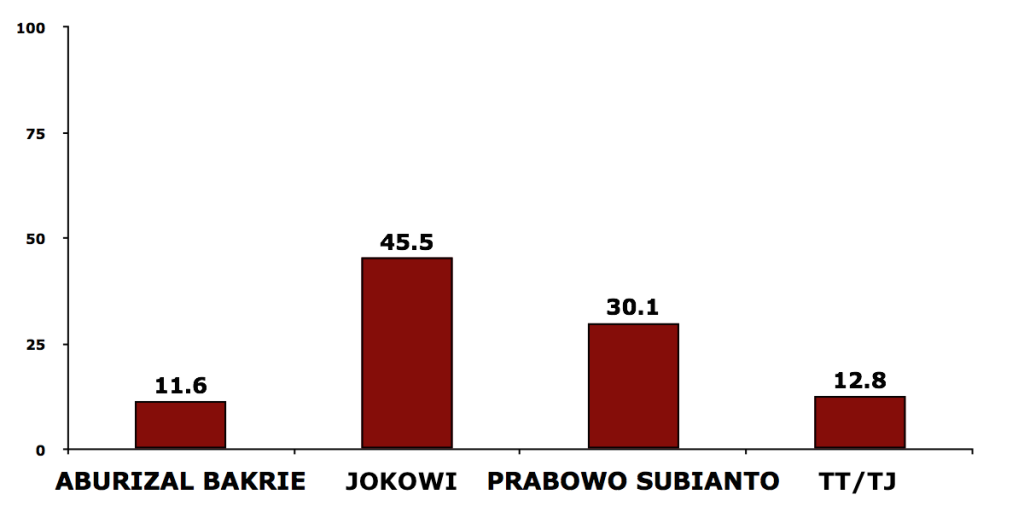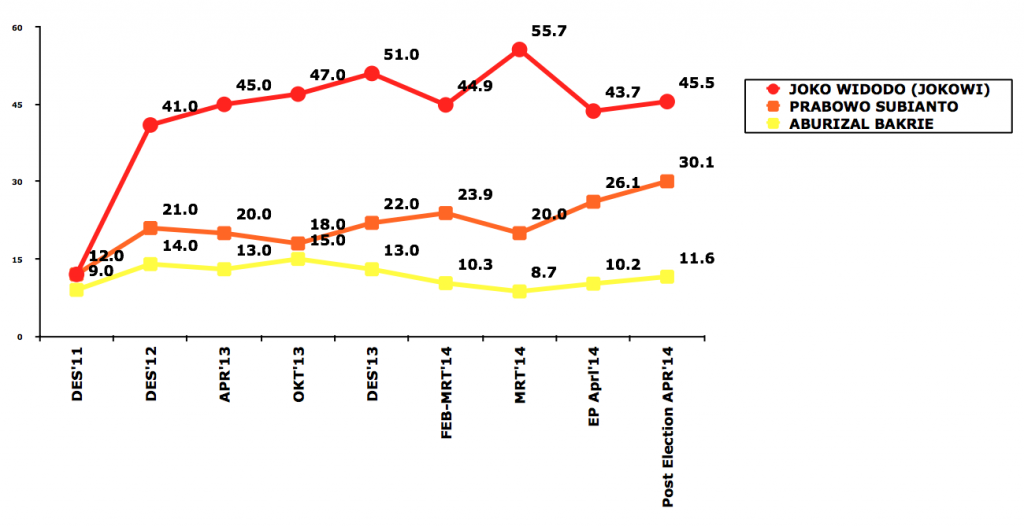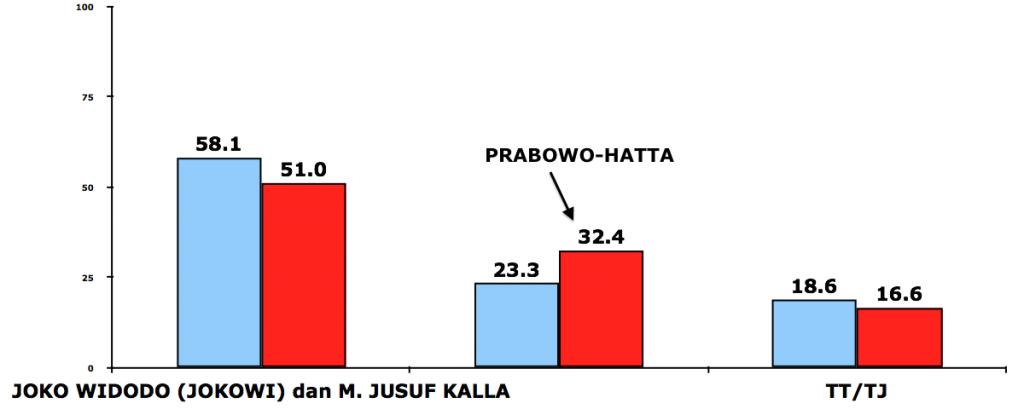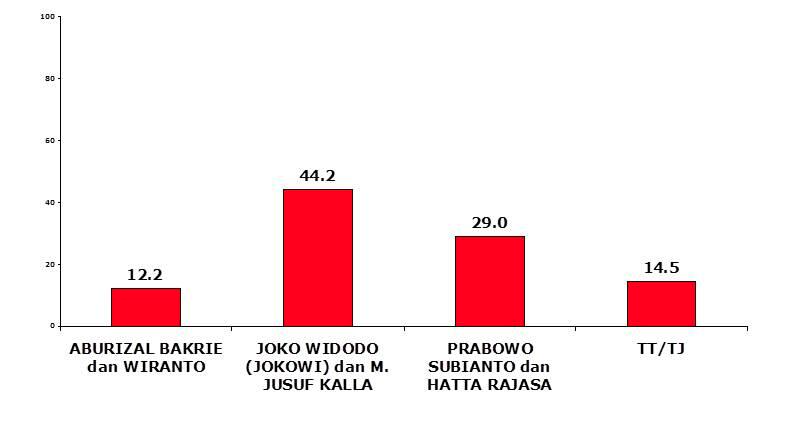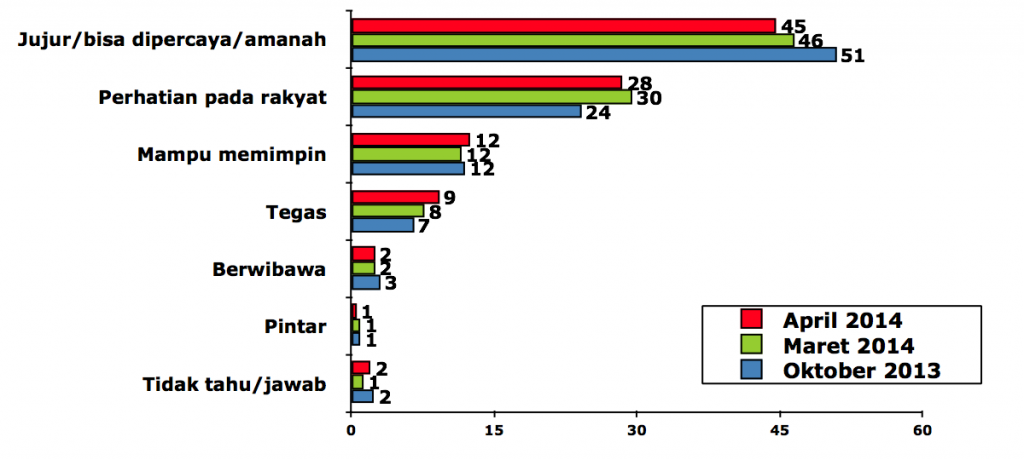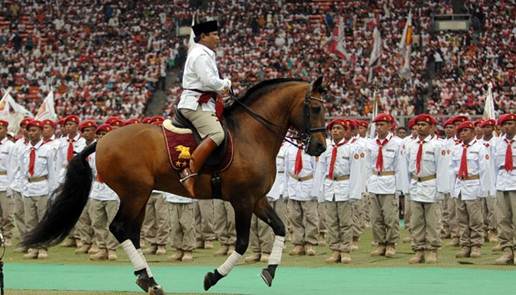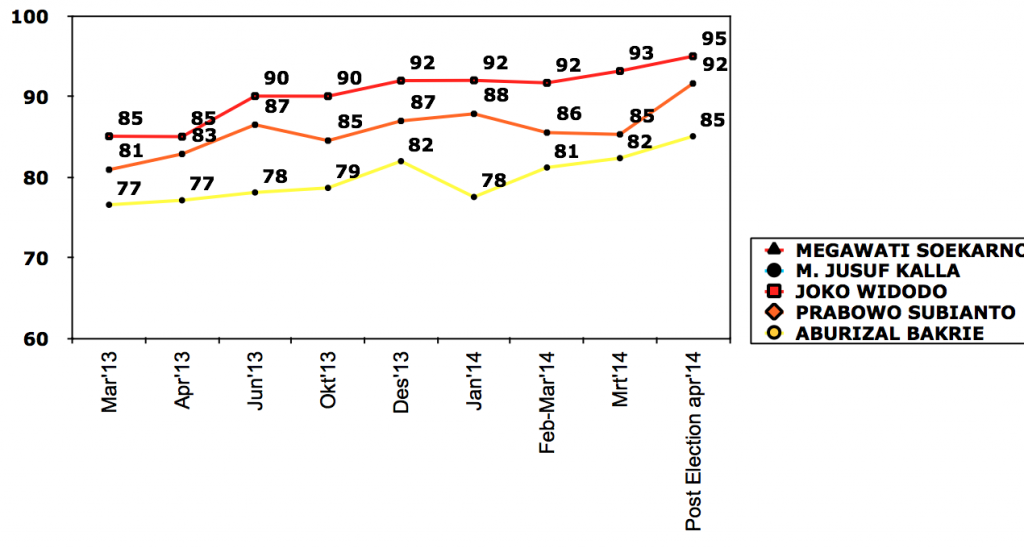The good people at Indikator in Jakarta released new polling today on the state of Indonesia’s 2014 elections. As usual, you’ll find the Bahasa Indonesia slides at their website, but I’ll pick out the most important information and summarise it here.
Who’s winning?
Indikator, as usual, asks all sorts of questions about voting intentions in a presidential race, with numerous hypothetical fields of candidates. Let’s go straight to the most likely situation in July: a three-way race between Jokowi, Prabowo Subianto and Aburizal Bakrie.
With 12.8% of respondents uncommitted, Jokowi still maintains a 15-point lead over Prabowo, as the chart above shows. Bakrie is back into double digits, so I guess there’s a silver lining for the old geezer.
To the extent that a trend is legible, it’s not in Jokowi’s favour. The chart below shows that Jokowi’s vote has declined from a high of 55.7% in Indikator’s poll conducted between 18-24 March, to 45.5% in the new poll, which was in the field between 20-26 April. (Note that the exit poll conducted on the day of the legislative election on 9 April also appears here–but that represents, obviously, a different sample).
The veepstakes
Indikator also paired candidates off with a whole range of possible vice-presidential candidates to measure how different hypothetical tickets would perform. I won’t dwell on this because these tickets probably won’t remain hypothetical for too long. The conclusion from the poll is quite simple: the vice presidential pick doesn’t make that much difference to presidential candidates’ electability ratings. Suffice it to say that in a two-ticket race between Jokowi-Jusuf Kalla and Prabowo-Hatta Rajasa, the former wins out–though with 16.6% or respondents uncommitted, as the chart below shows.
If these two tickets are joined by a Bakrie-Wiranto campaign (yes, I know–ewww) the situation looks like this, with Jokowi-Kalla still maintaining a decent lead.
One possible candidate does definitely make a difference for Jokowi: Puan Maharani, Megawati Soekarnoputri’s daughter and architect of PDI-P head office’s widely-panned legislative campaign. Jokowi’s support falls by five points when a hypothetical Jokowi-Puan ticket is put to the punters, compared with a question in which no running mate is presented. Obviously they don’t appreciate Puan’s charms as much as Puan does.
What people want
In terms of the qualities voters desire in a candidate, nothing much has changed since previous Indikator polls were taken (see here and here for our rundowns). Topping the list in the chart above are ‘honesty/trustworthiness/amanah (professionalism, or honourability)’ and ‘care for the people’. Jokowi leads on these qualities. Prabowo beats him by a mile when it comes to being seen as tegas (firm) and berwibawa (authoritative). These are definitely his strong suits, but the fact is that few voters say that these are the most important qualities they look for in a candidate.
Interestingly, Indikator compared answers to the above question about candidate qualities with data on media consumption. The responses suggest that those who consume news on the internet daily are more likely to value ‘firmness’ and ‘authoritativeness’ in a candidate. (Is the poll picking up Prabowo’s legions of Facebook friends, then?)
A few thoughts
The big story in this and other recent polling is, of course, that the gap between Jokowi and Prabowo has narrowed significantly: roughly, the former has lost 10 points and the latter has gained the same. The question is why–and the answer will necessary involve a lot of speculation. Nevertheless, Marcus Mietzner offers a compelling account over at Inside Indonesia of how the failures of Jokowi’s campaign allowed Prabowo to gain ground, leaving the governor looking quite a bit more vulnerable than he did even a short while ago. In short: a botched legislative campaign played a large part. PDI-P failed to take the opportunity to publicise its association with Jokowi and allow him to use the national stage to deliver an appealing message.
Much has been made of Jokowi’s unwillingness to talk on ‘issues’ of ‘substance’ (including me; I saw him campaign in Malang in April and wasn’t that impressed). To be more specific, he needs to start making promises. It’s not difficult, and he’s done it before in his successful run for the governorship of Jakarta in 2012. A Jokowi ‘vision’ for the imminent presidential campaign doesn’t need to be more sophisticated than a few attention-grabbing, concrete and easily-understood promises in areas such as healthcare, education, job creation and anti-corruption. Voters don’t need or want to hear rumination on Indonesia’s place in the world, national sovereignty or nebulous ideas of social justice. They certainly aren’t interested in the sort of hackneyed tropes like those his ghostwriters put in Kompas over the weekend.
At the same time, you have to take your hat off to the underdog in this race, Prabowo Subianto. Whatever you think of Prabowo and his party, they’ve got to be credited with having run a very professional campaign–and, unlike the Jokowi camp, maintaining a coherent campaign organisation and communications strategy. You (and I) might struggle to look at scenes like this…
…without amusedly thinking of this, but seen in light of the figures above, Lord Sidcup Prabowo is playing to his strengths as the tegas candidate. As Prabowo says, ‘my critics always say I am a threat to democracy, blah, blah, blah. I believe in democracy and in human rights’–but I’m going to go out on a limb here and say that he’s deliberately appealing to a certain variety of nostalgia in his embrace of what the Financial Times called ‘dictator chic’. Combined with a pro-poor policy platform far more serious-looking than anything his opposition is offering, and a communications strategy which puts the candidate and his promises front and centre, it’s working.
Just one more ‘on the other hand’ observation, though. As much as this race has tightened, Jokowi is still winning it. And it should never be forgotten just what a remarkable political phenomenon he represents in the Indonesian context. There was one chart in today’s poll which really gets at this fact, and which I’ve pasted in below. Take a look at Jokowi’s name recognition level in March 2013. He was on 85%, higher than Prabowo or Bakrie, longtime stalwarts of the establishment (indeed, the oligarchy) who had spent years and untold millions of dollars in getting to where they are. A short while after being elected Governor of Jakarta, Jokowi was already the most famous and popular politician in Indonesia. If ever we get bored with the 2014 campaign, start thinking about the future in light of this fact, and the possibility that the next-next president of Indonesia may well be one of the reformist mayors, governors or Bupati making a name for themselves at the local level–or indeed, somebody we’ve never heard of. Whether he wins or loses in 2014, that’s one thing I think we can be grateful to Jokowi for.
……………
Liam Gammon is a PhD candidate at the Department of Political and Social Change at the Australian National University, researching populism in Indonesia.
 Facebook
Facebook  Twitter
Twitter  Soundcloud
Soundcloud  Youtube
Youtube  Rss
Rss 